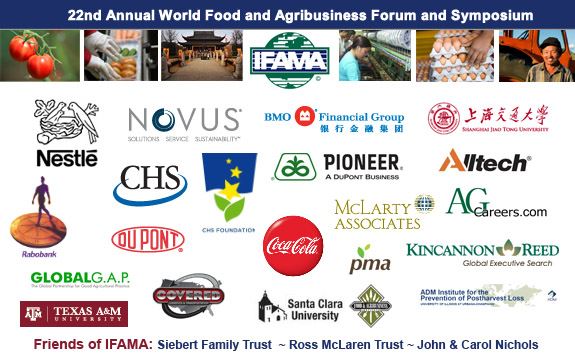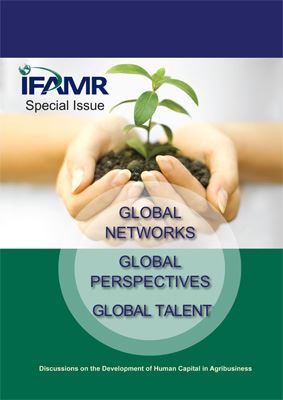|
IFAMA 22nd Annual World Forum and Symposium
Shanghai, China | June 10 - 14, 2012
|

Conference Program |
Symposium Research Papers Speaker Interviews Market Journal | University of Nebraska, USA Interviews from Shanghai |
Forum Day 1
Opening Remarks
Mary Shelman, Harvard Business School, IFAMA President
CAI Wei, Vice President, Shanghai Jiao Tong University
2012 Fellows Award Recipients
Since its founding, IFAMA has been successful due to the vision, hard work and creative efforts of a few key individuals. These individuals have distinguished themselves as leaders in the food and agribusiness industry as well as in service to IFAMA. This is the highest award given by IFAMA and is only awarded to members who have made outstanding and sustained contributions to the success of the organization.
Erica Kuhlmann, Marketing Executive and Managing Director, Food and Consumer Group, BMO Harris Bank, Chicago, USA
Jacques Trienekens, Professor, Management Studies, Wageningen University, The Netherlands
Daniel Conforte (1955 - 2012), Senior Lecturer in Agribusiness, Massey University, New Zealand
The Road to 2050: The China Factor
Moderator: Mary Shelman, IFAMA President [Presentation]
China’s Role in the Global Food Economy: A Look Forward
As China and other countries seek to secure a portion of their future food resources from other regions in the world, global relationships must expand and evolve. How will Chinese and foreign companies successfully cooperate in the future?
Patrick Yu, President, COFCO
Roger Heng, Deputy President, Bank of Montreal (China) Co. Ltd. [Presentation]
Changing Internal Demand and Sustainable Development
Moderator: Mary Shelman, IFAMA President
Rapidly Expanding Internal Markets in China: Opportunities and Challenges
China became the world’s second largest economy in 2010 and is poised to overtake the United States in 2030, if it can continue its move from export dependency to the development of an internal market. What opportunities and challenges come with this transition?
Nick Rosa, Managing Director, ContiAsia
Food Safety: A Threat or an Opportunity?
This presentation will address food safety and security from a long-term supply and demand perspective. China has taken important steps to make food safety a priority, with the nation’s first food safety law taking effect in 2009. How can the opportunities be managed?
Roland Decorvet, CEO, Nestle China
Food Waste from Post-Harvest Loss
Recent analyses indicate that approximately 1/3 of the food produced for human consumption is lost or wasted globally, which amounts to about 1.3 billion tons per year. Losses in Eastern and Southern Africa alone are valued at $1.6 billion USD per year, or about 13.5% of the total value of grain production. This presentation explores current knowledge regarding this issues and proposes way to effectively reduce loss in agribusiness food chains.
Steve Sonka, Director, ADM Institute, University of Illinois [Presentation]
Development of Good Agricultural Practice in China
The challenge of globalizing markets is nowhere greater than in the primary food sector. In China, safe food is no longer considered a luxury but a necessity. What is the current status of Good Agricultural Practices in China in meeting those global and domestic needs?
Moderator: Kristian Moeller, Managing Director, Global Gap [Presentation]
Yang Zhigang, Certification and Accreditation Administration, PRC
Carlos Abboud, Founder and Executive Vice President, Newbell Trade [Presentation]
Nan Li, Director, Market Transformation Initiative China, WWF [Presentation]
Joseph Wozniak, International Trade Center, UN
Daniel Sham, President & Managing Director, dTREE & Associates
Supply Chain Integration and Agro Park Development
Increasing purchasing power is revolutionizing food consumption patterns in terms of quality and quantity. What role does vertical integration and/or agroparks (e.g., vertical and horizontal integration of a number of value chains) play in delivering safe, high-quality, and eco-efficiently produced foods?
Moderator: Henk van Latesteijn, CEO, Value Mediation Partners
Xiaoyong Zhang, Senior Researcher, Wageningen UR [Presentation]
Innovation, Technology, and Food Security
Many technical innovations in agricultural and food systems are sparked by biotechnology. How does China look upon the role of agricultural bio-technology in ensuring adequate food security?
Moderator: Michael Cook, Professor, University of Missouri
Jennie Shen, Director, Business Affairs and Bus. Development, Pioneer China
Ismael Roig, President, ADM, Asia Pacific
Yuping Lu, General Manager, DBN Biotech Center, Beijing [Presentation]
Linking Food Safety and Sustainability Business Opportunities in China
What are some strategies the private sector can implement for a safer food supply. Can businesses maintain the trust of consumers? Western companies — with the specialties in equipment and expertise in management knowledge developed from years of compliance with stringent sustainability regulations — can export knowledge to assist their Chinese counterparts meet the rising levels of Chinese environmental laws and informed consumers. In this session two companies will present their business strategy linking food security and sustainability and share experiences with this strategy in China.
Moderator: Sander Mager, Director, License to Grow [Presentation]
Jan Holthuis, CEO, HIL Lawyers & Advisers
Jan Cortenbach, CTO, Wellhope - De Heus China [Presentation]
Bram Koppert, Project Manager China, Koppert Biological Systems [Presentation]
Forum Day 2
The Role of China in the Evolving Agricultural World
Moderator: Carole Brookins, Managing Director, Public Capital Advisors
The Changing Chinese & World Consumer: Creating Shared Value and Future Impacts
With the rapid rise of China’s middle class and other global trends in food consumption, what will be the impact for the agricultural world?
Dan Meagher, President, Global Animal Nutrition Solutions, Novus International [Presentation]
China’s Production Potential: Strategies and Policies
Since adopting market-based reforms 30 years ago, China’s ability to meet its food and agricultural needs has exceeded expectations. How has China succeeded? Will they meet current and future needs? What can other countries learn?
Brady Sidwell, VP Corporate Development and Strategy, OSI Group, Asia Pacific, Middle East and Africa [Presentation]
China Investments Abroad: What Will it Look Like in 2020?
To what extent is China looking overseas to ensure food security? What is China’s investment strategy abroad?
Alex Chu, Chairman, Managing Director, Everbright Asia Pacific Investment, Union Bright Consultants [Presentation]
The Role of China in the Evolving Agricultural World
Moderator: Marcos Fava Neves, Professor, Marketing and Strategy, University of Sao Paulo
Changing Position of China in the Global Food Market
Rapid economic developments have changed China’s position in the global food market. Not only in their share of the market, but also in their influence in that market. How will China’s position further change?
Daron Hoffman, Director, Food & Agribusiness Research, Rabobank [Presentation]
Trade Liberalization: The Keys to Sustaining Growth?
As the world’s largest agricultural economy and an important player in world agricultural markets, China’s role in international agricultural trade has implications for agricultural producers, consumers, and policymakers globally. What are the trends for the future?
Zuo Changsheng, Deputy Director General, Agricultural Trade Promotion Center, Ministry of Agriculture, PRC [Presentation]
Outlook on Global Cooperation and New Strategic Alliances
With China’s changing role their needs for new strategic alliances also changes. What characterizes these new strategic alliances? What types of global cooperation fit best with China’s need?
Akarin Gaw, Executive Director, Business Development, Americold [Presentation]
Doing Business in China: “Alone a Bumpy Road, Together a Drivable Way”
Even as China has become more open to Western firms, many feel it still remains tricky territory to navigate. What are proven strategies to successfully start a business venture in China?
Moderator: Sander Mager, Director, License to Grow
Ina Enting, Managing Director, Dutch Meat & Feed Centre [Presentation]
Berry Wang Wei, Chief Representative China, Dutch Meat & Feed Centre
New Global Players from China
In the last few years some Chinese businesses have transformed from rapidly expanding local players to dominant players in the world market. What does this development mean for the agribusiness community, and how will this influence global strategic alliance in the marketplace?
Moderator: Marcos Fava Neves, Professor, Marketing and Strategy University of Sao Paulo
Raj Vardhan, Senior Vice President, Regional Controller China, Olam Intl. [Presentation]
Jiqin Han, Professor, Nanjing Agricultural University
Models for Human Capital Development in China and Beyond
All around the globe the future of the industry is determined by the quality and competencies of the people involved. Human capital development is a new rising star on the strategic agenda of agri-businesses. What are the opportunities and challenges? What role can IFAMA play?
Moderator: Aidan Connolly, Vice President, Alltech
John Purchase, CEO, Agricultural Business Chamber, South Africa
Gregory Duerksen, President, Kincannon & Reed [Presentation]
Dennis Conley, Professor, University of Nebraska and Chair, IFAMA Human Capital Task Group [Presentation]
IFAMR Special Issue:
